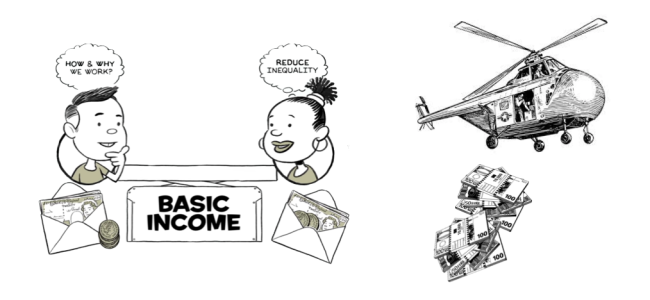Similarities between helicopter money and basic income have led to increasing confusion in the public debates around those two concepts. In an article published on the Basic Income Earth Network‘s website, our campaign coordinator Stan Jourdan aims to clarify how the two concepts overlap and yet, are two distinguished policy options.
First the article explains how QE for People (or helicopter money) and basic income overlap:
Undeniably, there are resemblances between the two concepts, as both involve making unconditional payments to all citizens and usually without means-testing. Basic income’s principles of universality and unconditionality can also be found in helicopter money.
And further on, the article also finds some common theoretical roots:
several key advocates of basic income have put forward the case that money creation could be used to finance the benefit, either as a “boot” phase or as a way to supplement the fiscal means to finance basic income schemes. The French economist Yoland Bresson made the case that perpetual low interest sovereign bonds could be used to kick off the basic income in a first stage, thus leaving time for the government to implement all the necessary reforms of the tax-benefit system to make UBI fully functional.
Different objectives, different institutions
The paragraph below best summarizes the key distinctions between basic income and helicopter money. It stresses that both policies are in fact pursuing different political objectives, and therefore, they fall into different institutional frameworks:
Put simply, helicopter money can be framed as a punctual measure (extreme, one may say) with a rather narrow purpose: to stimulate economic activity by boosting people’s incomes under some strict circumstances, that is, when the economy is under threat of deflation.
Basic income, on the other hand, pursues a very wide range of objectives from poverty alleviation to work emancipation, gender balance incentivization, social protection modernization, more aggressive redistribution and so on. In contrast, stimulating people’s purchasing power is certainly not the main argument for doing basic income.
From those different objectives also stem different institutional frameworks. If the objective of helicopter money’s proponents is merely to stimulate demand, then transfers to citizens is only one practical means by which to achieve this single clear goal. From this viewpoint, it also makes sense to give independent central banks the legal capacity to distribute a citizens’ dividend as a new instrument in the monetary policy toolbox.
If basic income pursues more numerous and complex objectives, by contrast, it then makes sense that it should be the responsibility of elected governments to design and implement it, just like any other fiscal policy.
Strategic synergies
Despite those clear distinctions, the article identifies a strategic overlap between the two concepts:
From a basic income viewpoint, the rise of the helicopter money discussion is a useful addition to basic income’s financing question. If central banks can create money, then surely it would be easier to finance a basic income.
On the other side, it is also convenient for helicopter money proponents that the basic income discussion is making headway in the argument for universal and unconditional payments to citizens: it levies an important moral blocage.
Even more strategically, perhaps, there is a case for seeing helicopter money as a necessary step to the implementation of a full-fledged basic income policy.
From the QE for People’s campaign perspective, those synergies play an important role in strengthening our movement. However, it is clear for us that the notion of basic income goes beyond the scope of the QE for People campaign. The two policies are pursuing different objectives which therefore have to be advocated from different organisations.
Hence, the fact that a number of basic income supporters also promote QE for People proposals does not mean that our campaign is in turn advocating for the introduction of a universal basic income in the EU. Our campaign’s goal – namely to radically update the monetary policy toolkit – is big enough to focus on!
Note: This article was originally published on the QE for People campaign website. As we are gradually phasing out the QE for People campaign, we are archiving this publication here. For more information, read the history of Positive Money Europe.

